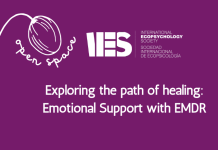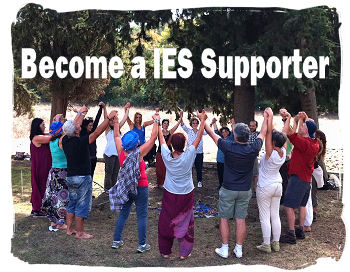One of the key concepts of ecopsychology is Roszak’s ecological unconscious, which emphasizes the interconnectedness of all living things and the possibility for humans to live in harmony with the natural world. This perspective challenges the dominant worldview that humans are separate from nature and that the natural world exists only to meet our needs.

For Roszak (1995) [1] , the “Ecological Unconscious” is at the core of the psyche, so that we resort to it as a resource to reintegrate ourselves into natural harmony. It is a source of information with which we are connected and that comes from the entire web of life. Human beings can have not only the memory of all the human experience accumulated throughout the centuries and cultures, but also of the experience of all the animal, vegetable and mineral species that inhabit the earth.
To deepen this connection to the web of life, ecopsychology suggests that we need to explore and expand our senses. According to David Abram[2], our perception of the world is not simply a matter of receiving sensory information, but rather an act of active participation in the fabric of the world. By paying attention to our senses and the world around us, we can develop a deeper and more meaningful understanding of our place in the world.
In this vein, Michael Cohen’s research on the 54 senses is a fascinating exploration of the different senses that influence our experience of the world and how we can expand our consciousness to access them.
“Each natural sense is a distinct, living sensation, an inherent natural attraction to love, a thread in the web of life, a genetically ingrained chain that helps keep the life of the world in balance, including people, through universal communications of natural attraction, orientation and motivation” Cohen [3]

Each sense is an awareness of our love for life and for our mother earth. Consciously or unconsciously, each sense is an actualization of the essence of love that Eric Fromm[4] called “biophilia,” the attraction to all that is alive. Thus our 54 natural senses are our way of registering the unified field and being in communication with ourselves and with others, including members of the web of life.
Cohen’s 54 Senses are multi-sensory intelligence, not narrative, balanced sensory wisdom, shaped by community relations in action. Nature works cooperatively within and around us. However, the narratives of Western culture tell us that life is about competition and survival. Abram also explores how culture and language influence our perception of the world, limiting our ability to fully and meaningfully perceive and understand it.
Cohen describes a wide variety of senses that go beyond the traditional five senses of sight, sound, smell, taste, and touch. Senses that are not associated with a specific organ and are associated with a natural integral experience. Some examples include the sense of energy perception, the sense of balance, the sense of time and the sense of intuition, the sense of presence, the sense of humility, the sense of heliotropism, and the sense of belonging. . By cultivating these senses, we can develop a greater connection with nature and a greater ecological awareness.

In short, our expanded senses are thresholds to actualize our ecological unconscious, this subconscious dimension of our relationship with the natural world, which includes our emotions, intuitions, instinctual responses to the environment, and regenerative wisdom, allowing us to develop a greater eco-empathy and compassion for the natural world, so important in our current moment of civilization.
[1] Roszak, T. (1995). The Voice of the Earth: An Exploration of Ecopsychology. Phanes Press.
[2] Abram, D. (1996). The spell of the sensuous: Perception and language in a more-than-human world. Vintage.
[3] Cohen, MJ 2008. EXPERIENCE OF THE NATURAL SYSTEM: Identify and benefit from the fifty-four senses of natural attraction (cobwebs) that you have learned to forget in order to remember. To Reconnect with Nature.
[4] Fromm, E. (1956). El arte de amar. México: Fondo de Cultura Económica.












